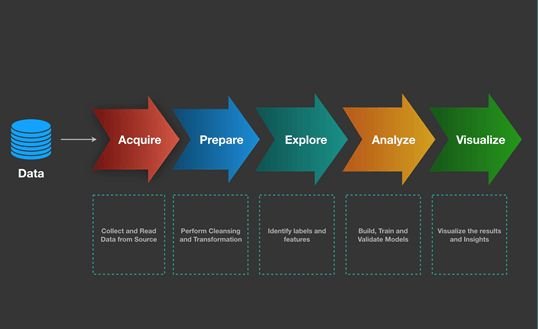In the realm of Data Science, the question arises: “How does one embark on a career path in Data Science as a beginner? How can a career in data science be started without prior experience? Should one learn R or Python? What techniques should be focused on? Is learning Data Science easy?”
Data science’s ubiquity is unquestionable at present. Organizations are heavily investing in integrating data science solutions into their daily processes. Learning data science in this era opens doors to exciting industry opportunities. With the right education and qualifications, numerous jobs await in this field.
This article aims to guide those starting in Data Science. It dispels the myth that one must master an exhaustive list of skills such as programming, databases, statistics, linear algebra, calculus, distributed computing, machine learning, visualization, experimental design, clustering, deep learning, and natural language processing from the outset.
What Is Data Science And Its Workflow?
Data Science is a field that combines statistical analysis, computer science, and specialized knowledge to extract meaningful insights from data. It involves collecting, cleaning, and analyzing data to discover trends, patterns, and connections that can help in decision-making. Data scientists use various tools and techniques, including programming languages like Python or R, machine learning algorithms, and data visualization, to turn large and complex datasets into useful information.
The workflow in data science typically starts with defining the problem or question. Then, data is collected from various sources and prepared for analysis. This includes cleaning and organizing the data. Next, data scientists explore the data to find patterns and relationships. They then build and train models using machine learning algorithms to predict or classify future data points. Finally, the results are evaluated and communicated through visualizations or reports. This workflow is iterative, often requiring adjustments and refinements to the models and approaches as new data and insights emerge.
The following is data science workflow looks like this:

Data science does not necessarily demand advanced mathematical skills or deep learning mastery. It requires proficiency in a programming language and the ability to work with data. Basic mathematical understanding suffices for a start, although deeper knowledge enhances expertise.
Surely, these specialized skills may eventually assist in solving complex problems, but initially, a foundational understanding in relevant areas paves the way for a successful journey in data science.
Is A Career Path In Data Science For Everyone?
It is observed that individuals with a strong background in mathematics and computer science have an advantage in becoming data scientists. However, the field of data science is diverse. DJ Patil, the former U.S. Chief Data Scientist, stated, “Data science doesn’t care about what you majored in or if you even got a degree. It’s what you do with data that matters.” This highlights the inclusivity and potential for anyone with dedication and interest.
How To Choose The Right Role In Data Science?
The data science industry offers varied roles, including data visualization experts, machine learning experts, data engineers, and data scientists. It is important to understand the field’s requirements and prepare accordingly before choosing a role.
Learn A Tool / Language
Deciding to pursue a career as an experienced data scientist necessitates starting from the basics. Every field has its starting point, and data science is no exception.
Programming languages, driven by logic, instill structured thinking in learners. The world’s most proficient coders often share traits of patience, perseverance, and a penchant for exploration. Beginners typically initiate their coding journey with HTML/CSS. Though primarily markup languages, they lay the groundwork for structured thinking. After mastering HTML/CSS, one can advance to Python or other programming languages. Python and R are particularly favored in the field of data science.
For those new to algorithms, learning tools like Scratch can be incredibly beneficial. Scratch fosters creative thinking, systematic reasoning, and collaborative working skills, making it an excellent introduction to coding. In modern data science, it’s crucial to understand the application of native algorithms in appropriate contexts. Initially, it is not necessary to code every algorithm from scratch.
Follow The Right Resources
An admirable data scientist earns respect through their adept handling of complex data forms, applying unconventional algorithms, and extracting valuable insights to aid companies in informed decision-making. The right resources for learning the basics of programming and mathematics are readily accessible with a simple Google search. The internet is abundant with resources offering top-notch content for foundational learning in these areas.
Take Up A Course And Complete It
Today, data science stands as one of the most rapidly expanding sectors in the technology field. Achieving a dream job in this area requires mastering essential skills such as data analysis with Python and SQL. Going beyond these fundamentals to build Machine Learning algorithms can further enhance one’s expertise and career prospects.
Work On Your Communication Skills
Effective communication skills are crucial for success in various aspects of life, including many professional roles. In the realm of data science, there is a common misconception that technical proficiency alone is sufficient to excel, particularly in interviews. However, this belief is misleading. Strong communication skills are, in fact, essential, not just for securing a role but also for excelling within it. Efficient communication is key when sharing ideas with colleagues or presenting points in meetings, making it a vital skill for anyone in the field.
In pursuing your data science career, remember that data science jobs are often found in industries where data is plentiful, guiding you to where your skills are most needed. I wish you success in your data science career.
Last Updated on February 13, 2024




